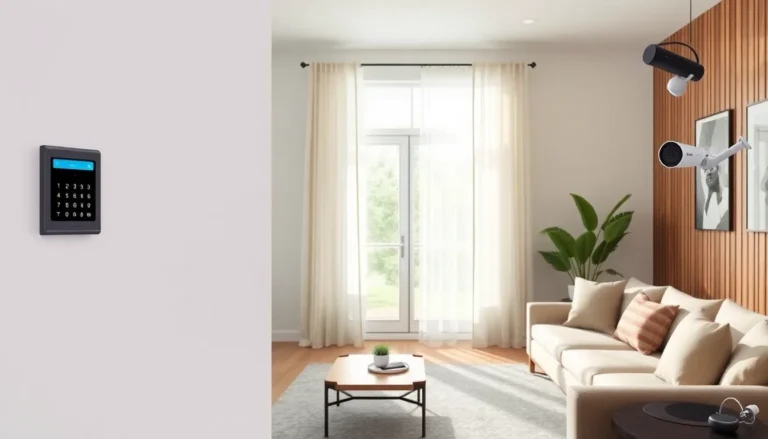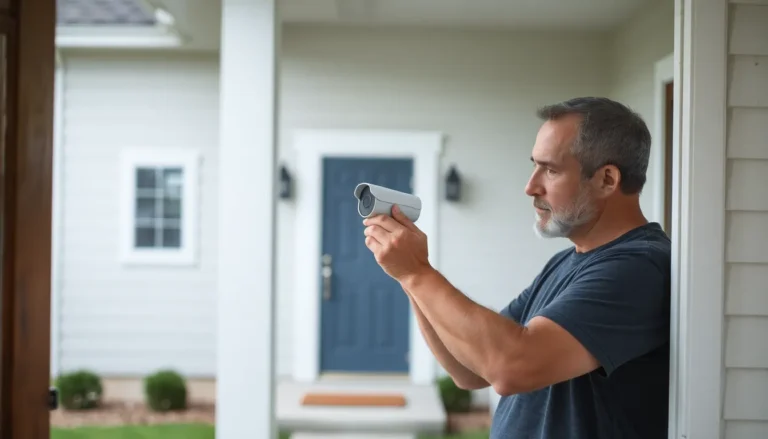In a world where even your toaster can connect to the internet, keeping your home secure shouldn’t feel like a game of hide and seek. Smart home security systems are here to save the day, turning your humble abode into a high-tech fortress. Imagine a world where your doorbell can tell you who’s at the door—no more awkward encounters with that neighbor who thinks he’s a ninja.
These systems don’t just keep the bad guys out; they also bring peace of mind to your daily life. With features like remote monitoring and smart alerts, you can keep an eye on your home from anywhere, even while binge-watching your favorite show. So why settle for old-school locks when you can embrace the future of home security? It’s time to upgrade and let technology do the heavy lifting, leaving you free to focus on more important things—like figuring out how to keep that toaster from burning your bagels.
Table of Contents
ToggleOverview of Smart Home Security
Smart home security combines technology and convenience to protect residential properties. Remote access to security features empowers homeowners. Users can monitor their homes in real time through smartphones or tablets. Smart cameras play a critical role, offering high-definition video and two-way audio capabilities.
Integration with smart devices enhances overall security. For instance, motion sensors can trigger alerts when unusual activity is detected. Automated lighting can deter potential intruders by simulating occupancy. Homeowners benefit from advanced encryption protocols that safeguard personal data.
Many systems incorporate artificial intelligence, enabling them to learn from user behavior. This intelligence allows devices to distinguish between familiar faces and potential threats. Alarm notifications can be customized based on individual preferences to reduce false alarms.
Compatibility with other smart home devices increases functionality. Home automation systems such as smart locks and doorbell cameras provide additional layers of security. When homeowners lock their doors remotely, they can rest assured their properties remain secure.
Statistics reveal that homes with smart security systems experience a significant decrease in break-ins. Studies show these systems offer up to 30% more protection compared to traditional methods. The demand for smart home security solutions continues to grow, driven by increased awareness and technological advancements.
Homeowners considering a smart security upgrade should evaluate various features and pricing options. Investing in reliable brands with positive reviews ensures effectiveness and longevity. Prioritizing integration and ease of use can enhance overall satisfaction.
Benefits of Smart Home Security

Smart home security systems offer numerous advantages for modern households, significantly improving safety and convenience.
Enhanced Convenience
Instant access to home security offers unparalleled convenience. Homeowners can monitor their properties remotely from smartphones or tablets. Smart locks and doorbell cameras allow entry control with just a tap. Real-time alerts notify users of unusual activity, ensuring proactive measures can be taken. Devices often integrate seamlessly with other smart home technologies, creating an interconnected security network. Compatibility enhances functionality and streamlines user experience. Customizable settings provide tailored notifications, reducing unnecessary alerts and fostering peace of mind. Many systems allow interaction through voice commands, simplifying operation.
Increased Safety
The integration of smart technology drastically increases safety. Systems with motion sensors detect intruders and trigger alarms, deterring break-ins. Real-time video surveillance offers high-definition feeds, allowing homeowners to view their property at any time. Research shows homes with smart security systems experience a 30% reduction in break-ins compared to traditional setups. Artificial intelligence enhances security by learning user behavior, differentiating between familiar faces and potential threats. Alarm notifications can be personalized, minimizing false alarms and ensuring quick response. Overall, the deployment of smart home security significantly elevates the protection level of residential properties.
Types of Smart Home Security Systems
Smart home security systems come in various types, each designed to enhance safety and convenience. Understanding these options allows homeowners to choose the best system for their needs.
Smart Cameras
Smart cameras offer live video streams and high-definition recording capabilities. Users access these cameras remotely via smartphones or tablets, providing real-time insights into their property. Features like two-way audio enable communication with visitors or family members. Motion detection alerts notify homeowners of unusual activity, helping them respond promptly. Advanced models include facial recognition technology, allowing systems to distinguish between familiar individuals and potential intruders. Research reveals that properties equipped with smart cameras experience a significant drop in break-ins, contributing to enhanced home security.
Smart Alarms
Smart alarms serve as crucial components of home security systems. These alarms can be triggered by motion sensors or door/window breaches. Users receive instant notifications on their devices when an alarm activates, prompting immediate action. Many systems allow homeowners to customize alarm settings, reducing false alerts while maintaining effective protection. Integration with smart cameras enhances these alarms, providing visual confirmation of incidents. Homeowners benefit from alerts that can be monitored even when they’re away, ensuring their property remains secure at all times. Studies suggest that effective alarm systems can deter up to 90% of potential intruders, underscoring their importance in smart security setups.
Features to Look for in Smart Home Security
Smart home security systems offer various features that enhance protection. Prioritizing these aspects ensures optimal security and convenience.
Remote Access
Remote access allows users to monitor their homes from anywhere using smartphones or tablets. This feature provides real-time alerts for any unusual activity, keeping homeowners informed. They can view live camera feeds and receive instant notifications about breaches through dedicated apps. Many systems support cloud storage, enabling recordings to be accessed anytime. Ensuring compatibility with various operating systems enhances usability, making it easier to manage security settings on the go.
Integration with Other Devices
Integration with other smart devices boosts functionality and security. Compatible devices include smart locks, doorbell cameras, and home automation systems. When integrated, these tools provide a cohesive security experience, allowing users to control multiple features from one platform. Synchronization between devices can trigger automated responses, such as turning on lights when motion is detected. This interconnectedness enhances the overall protection of residential properties, making it difficult for intruders to exploit vulnerabilities. Prioritizing systems with extensive compatibility ensures a comprehensive security solution.
Popular Smart Home Security Products
Smart cameras lead the way in home security, providing real-time video monitoring and high-definition recording. Equipped with features like two-way audio and facial recognition technology, these devices help distinguish between familiar faces and potential intruders. Research indicates properties with smart cameras experience notable declines in break-ins.
Smart alarms also play a crucial role. Triggering when motion sensors detect movement or doors and windows breach, these alarms send immediate notifications to users. Customized settings reduce false alarms, enhancing reliability. Integration with smart cameras offers visual confirmation of incidents, significantly boosting security measures. Studies show effective alarm systems can deter up to 90% of potential intruders.
Smart doorbell cameras add another layer of protection. They enable users to see and communicate with visitors remotely through their smartphones. Many models incorporate motion alerts and video recording, allowing homeowners to monitor activity at their door. The convenience of answering the door from anywhere enhances overall security.
Smart locks provide enhanced entry management by allowing keyless access. Many locks integrate with smartphone apps for easy control and monitoring. Users can provide temporary access codes for visitors or service personnel, eliminating the need for physical keys. Security analytics show that homes utilizing smart locks report a significant reduction in unauthorized access.
Motion sensors contribute to comprehensive security setups. These sensors detect movement around the property and trigger automated responses, such as turning on lights or sending alerts. Effective use of motion detection can discourage potential intruders by creating the illusion of an occupied home.
Combining these products into an interconnected system maximizes security potential. Smart home security options cater to various preferences and budgets, enabling homeowners to choose the best solutions. Prioritizing reliable brands ensures long-term satisfaction and performance.
Embracing smart home security systems is a proactive step toward safeguarding residential properties. With features like real-time monitoring and customizable alerts homeowners can enjoy enhanced peace of mind. The integration of advanced technology not only deters potential intruders but also simplifies daily routines.
As smart home security continues to evolve the options available cater to diverse needs and budgets. Investing in reliable products ensures a seamless experience that elevates overall safety. By prioritizing smart solutions homeowners can create a secure environment that adapts to their lifestyle while effectively protecting what matters most.



